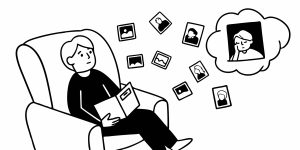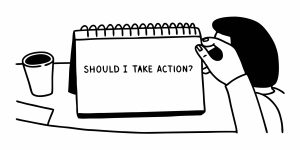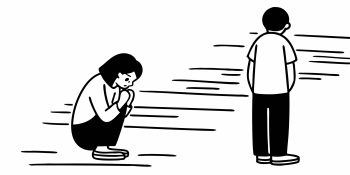Question More, Action Knowledge.
Remember, at QMAK, we don’t just teach; we empower. We don’t just inform; we inspire. We don’t just question; we act. Become a Gold Member, and let’s unlock your child’s full potential, one question at a time.
![]()
In life we are constantly faced with decisions that shape our paths and define our experiences. From small, everyday choices to life-altering crossroads, the way we navigate these decision points can have a profound impact on our happiness, fulfillment, and overall sense of purpose.
Embracing the concept of minimizing regret is a powerful tool for making decisions that align with our long-term aspirations and values.
In this article, we’ll explore the essence of the regret minimization framework, a decision-making model famously put forward by Jeff Bezos, the founder of Amazon. We’ll delve into the three-step process of applying this framework, its practical applications in both personal and professional contexts, and strategies for integrating this mindset into our daily lives.
Furthermore, we’ll examine recent research and insights from Daniel H. Pink’s book “The Power of Regret,” which challenges the notion of regret as a negative emotion and presents it as a valuable tool for personal growth and improvement.
At its core, the regret minimization framework is about making decisions that minimize the potential for future regret. It involves projecting yourself into the future, specifically to the age of 80, and assessing whether a particular action (or inaction) would lead to feelings of remorse or disappointment when looking back on your life.
The three-step process of applying the regret minimization framework is as follows:
Project yourself to age 80: Imagine yourself at that stage of life, looking back on your experiences and the choices you’ve made.

Consider your desired future state: Envision a life with minimal regrets, where you’ve made decisions that align with your values, passions, and aspirations.

Ask the key question: “In X number of years, will I regret taking this action (or not taking this action)?”

By considering the long-term implications of our choices, the regret minimization framework helps us cut through the noise of short-term emotions and focus on what truly matters in the grand scheme of our lives. It encourages us to prioritize decisions that lead to personal growth, fulfillment, and a sense of purpose, even if they involve short-term discomfort or uncertainty.
![]() One of the most famous examples of the regret minimization framework in action is the story of Jeff Bezos and the founding of Amazon. In the mid-1990s, Bezos was faced with a pivotal decision: whether to leave his secure, high-paying job on Wall Street to pursue his vision of online bookselling.
One of the most famous examples of the regret minimization framework in action is the story of Jeff Bezos and the founding of Amazon. In the mid-1990s, Bezos was faced with a pivotal decision: whether to leave his secure, high-paying job on Wall Street to pursue his vision of online bookselling.
Applying the regret minimization framework, Bezos realized that he would deeply regret not taking the risk and pursuing his idea, even if it meant facing potential failure. The possibility of future regret outweighed the comfort and security of staying in his current position. This realization gave him the clarity and courage to take the leap and found Amazon, a decision he attributes to the power of the regret minimization framework.
Contrary to the popular “no regrets” philosophy, “The Power of Regret” presents regret as a normal and essential part of human development. Children as young as six begin to experience regret, and its presence is considered a marker of a healthy, maturing mind. The absence of regret in adults is often a sign of serious neurological problems.
When approached constructively, regret offers three significant benefits:
1. Improved Decision-Making: By recognizing past mistakes and avoiding their repetition, regret enhances our decision-making skills.
2. Enhanced Performance: Reflecting on regrets can motivate individuals to persist longer and achieve better results in various tasks.
3. Deeper Meaning and Connection: Regret fosters a deeper understanding of our values and priorities, leading to more fulfilling relationships and life choices.

Through extensive research, including the American Regret Project and the World Regret Survey, “The Power of Regret” identifies four core categories of regret that transcend various domains of life:
1. Foundation Regrets: Failures in responsibility, conscientiousness, or prudence, often related to education, finances, or health.
2. Boldness Regrets: Missed opportunities for growth due to not taking chances or risks.
3. Moral Regrets: Actions that contradict personal values or societal norms, leading to guilt or remorse.
4. Connection Regrets: Fractured or missed opportunities for meaningful relationships with family, friends, or romantic partners.
While the regret minimization framework is often associated with major life decisions, it can be equally valuable when applied to smaller, everyday choices. By consistently asking ourselves the question of potential future regret, we can make decisions that align with our long-term happiness and fulfillment, regardless of their scale or immediate impact.
For example, consider the following scenarios:
Imagine yourself at 80, looking back on a missed opportunity to push yourself out of your comfort zone. Would you regret not taking that chance, even if it seemed daunting at the time?
![]() Consider whether you would regret not exploring a particular interest or developing a skill, even if it meant investing time and effort outside of your usual routine.
Consider whether you would regret not exploring a particular interest or developing a skill, even if it meant investing time and effort outside of your usual routine.
![]() Would you regret not speaking your truth or connecting with someone you care about, even if it felt vulnerable or uncomfortable in the moment?
Would you regret not speaking your truth or connecting with someone you care about, even if it felt vulnerable or uncomfortable in the moment?
By applying the regret minimization framework to these everyday decisions, we can cultivate a habit of making choices that prioritize our long-term well-being and personal growth.
While it may be challenging to teach children to avoid regrets altogether, we can guide them to reframe regrets as valuable learning experiences. By sharing stories like one where a grandchild, who used her regret about not spending enough time with her grandparents to inspire her to record her father’s stories, we can help children see regret as an opportunity for self-improvement rather than a source of shame or disappointment.
Here are some key principles that can help young minds develop this valuable decision-making skill:
Teacher’s Note: By introducing the concept of regret minimization in an age-appropriate manner and modeling its application in our own lives, we can help children develop the skills and mindset needed to make decisions that align with their long-term happiness and success.
To effectively harness the power of regret, “The Power of Regret” suggests a three-step process:
1. Self-Disclosure: Acknowledge and express regrets through confiding in others or expressive writing.
2. Self-Compassion: Treat yourself with understanding and kindness when reflecting on regrets.
3. Self-Distancing: Analyze regrets from a detached perspective to facilitate rational analysis and extract constructive lessons.
The Regret Optimization Framework proposes a balanced approach to decision-making, considering the four core regrets while acknowledging the tendency to overestimate the intensity and duration of future regret. The framework suggests:
1. Satisfice on most decisions: For choices not involving the four core regrets, make a decision and move forward.
2. Maximize on crucial decisions: For decisions involving the four core regrets, project yourself into the future and choose the option that minimizes the specific regret.
Cultivating the habit of minimizing regret is essential for making decisions that align with our deepest values and aspirations. By understanding the normalcy of regret, learning from real-life examples, recognizing the four core regrets, and adopting a balanced approach to decision-making, we can harness the power of this emotion to make better choices, enhance our performance, and cultivate deeper connections in our lives.
As we guide children to reframe regrets as learning experiences and practice self-disclosure, self-compassion, and self-distancing, we empower them to navigate life’s challenges with resilience and wisdom. Ultimately, by reframing our relationship with regret, we unlock its potential as a catalyst for positive change and personal transformation.
So let us ask ourselves the powerful question: “In X number of years, will I regret taking this action (or not taking this action)?” Let us use this framework to cut through the noise of short-term emotions and focus on what truly matters in the grand scheme of our lives.
In doing so, we open ourselves up to a world of possibilities, where every decision is an opportunity for growth, every challenge is a chance to overcome regret, and every moment is a step towards a life well-lived.
Objective: To practice reframing regrets as learning opportunities.
Objective: To develop long-term thinking and decision-making skills.
Objective: To practice applying the regret minimization framework to decision-making.
Objective: To identify and learn from the four core regrets.
Objective: To apply the Regret Optimization Framework to real-life decisions.
Eternal Sunshine of the Spotless Mind provides a fascinating exploration of how our attempts to avoid regret can paradoxically lead to deeper remorse.
Through Joel and Clementine’s decision to erase their painful memories, the film illustrates how choosing short-term relief over long-term meaning often magnifies future regret.
As students watch Joel desperately trying to preserve his memories mid-erasure, they witness a powerful demonstration of how we often don’t recognize the value of experiences – even difficult ones – until we face losing them completely.
The film’s unique narrative structure, moving backward through dissolving memories, helps viewers understand how regret can serve as a teacher rather than just a source of pain.
Through the characters’ ultimate decision to risk heartbreak again despite knowing their history, students learn that minimizing regret sometimes means embracing imperfection rather than avoiding potential pain.
Looking back from future days
Through the mist of time and haze
What choices would we make again?
Which paths would we defend?
Verse 1
In this journey we must make
Each choice a brush stroke, the path we take
But how do we navigate, this complex art
To minimize regrets, and follow our heart
Pre-Chorus
Time keeps flowing like a stream
Between what is and what could be
Chorus
At eighty years, looking back
Through the choices that we lack
Will these moments that we choose
Be ones we’re glad we didn’t lose?
(Didn’t lose…)
Verse 2
Some take leaps into unknown
Leave the safety they have known
Like Bezos choosing different ways
When comfort tried to make him stay
Bridge
Four regrets to guide us through
Foundation, boldness, what is true
Connections that we failed to make
Moral choices that we take
Verse 3
Every day we have the chance
To join this quiet, thoughtful dance
Between the now and yet to be
Between what’s safe and being free
Outro
Looking forward, looking back
Finding wisdom in the track
Of choices made and choices stored
In futures we’re still moving toward
Final spoken statements
Choose with wisdom…
Choose with heart…
Choose with time in mind…
Remember, at QMAK, we don’t just teach; we empower. We don’t just inform; we inspire. We don’t just question; we act. Become a Gold Member, and let’s unlock your child’s full potential, one question at a time.